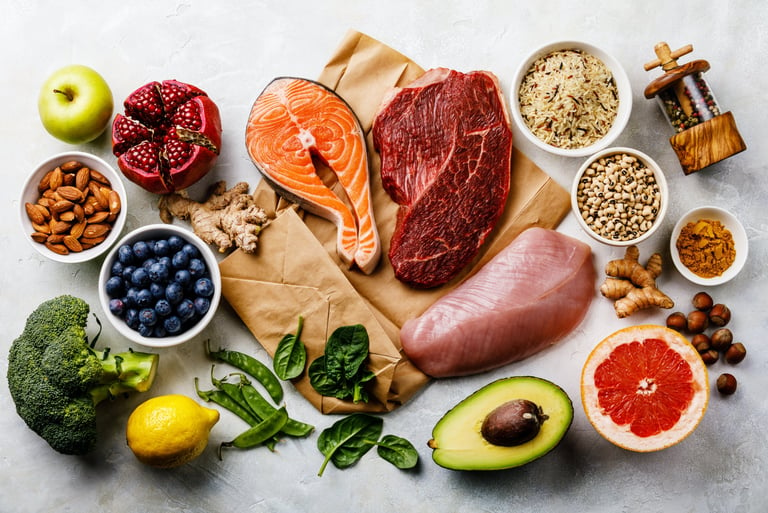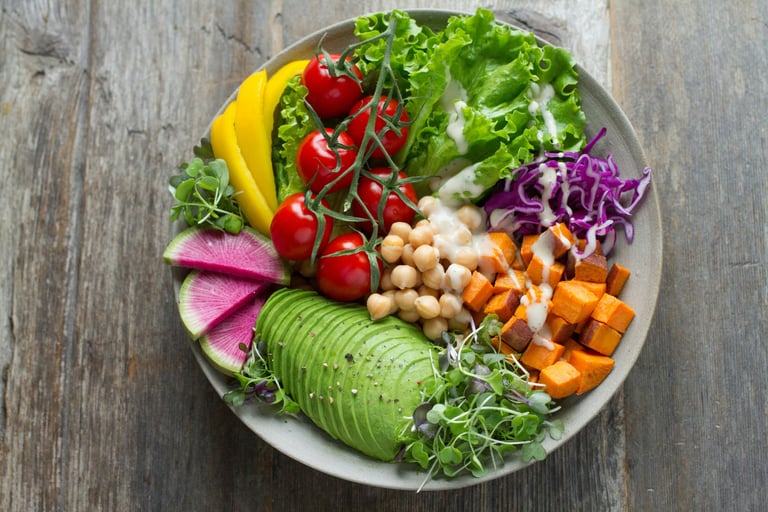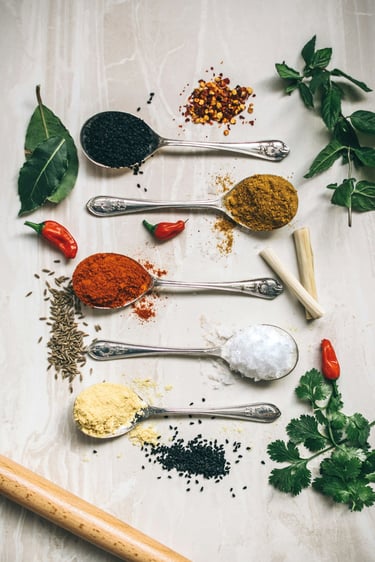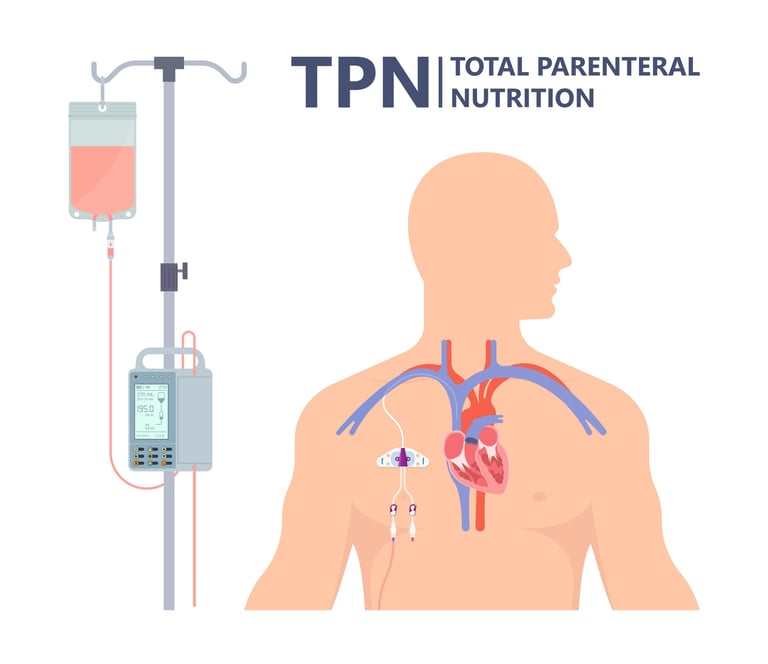Nutrition
21.03.2025
CANCER PATIENTS NUTRITION


Proper nutrition for cancer patients is of great importance in increasing the effectiveness of medications in the treatment process, alleviating side effects and improving general health status. Side effects caused by treatment in individuals undergoing cancer treatment can lead to nutritional difficulties such as loss of appetite, taste disorders and gastrointestinal problems. Therefore, adequate and balanced nutrition is critical to maintain the patient's energy level, support body functions and accelerate the healing process. A diet rich in protein, healthy fats, vitamins and minerals strengthens the immune system and prepares the body to respond better to treatment. In addition, adequate fluid intake facilitates the elimination of toxins and reduces the risk of dehydration, which is frequently seen during treatment. Nutritional needs of cancer patients are individual and may vary depending on the type of cancer, type of treatment, general health status and personal preferences. For this reason, the guidance of a dietitian or nutritionist is important when creating a nutrition plan. Nutrition plans for cancer patients aim to improve patients' overall well-being while ensuring they provide the best response to treatment.
Image 1: During cancer treatment, a healthy and balanced diet can affect treatment response rates, the development of treatment side effects and the course of the disease.


WHY IS NUTRITION IMPORTANT?
Nutrition in cancer patients is extremely important for many reasons. A good nutrition plan can support patients in their fight against cancer, improving the treatment process, easing side effects, and maintaining or improving overall health.
Reasons for the importance of nutrition in cancer patients:
Providing Energy and Nutrients: Cancer treatments, especially chemotherapy and radiotherapy, can put a strain on the body. A balanced diet can reduce the fatigue and fatigue that these treatments can cause by providing the body with adequate energy and essential nutrients.
Immune System Support: Adequate and balanced nutrition strengthens the immune system. This increases the cancer-fighting body's resistance to infections and can accelerate the healing process.
Reducing Treatment Side Effects: Good nutrition can alleviate side effects that may be caused by treatment. For example, adequate fluid intake reduces the risk of dehydration, while a balanced diet can relieve digestive problems such as nausea, vomiting and diarrhea.
Maintaining Weight and Muscle Mass: Cancer patients can often experience weight loss and decreased muscle mass. A balanced diet helps maintain body weight and muscle strength, which improves patients' overall well-being and quality of life. Preservation of muscle tissue is very important for the course of the disease.
Improving Tolerance and Response to Treatment:Adequate nutrition can enable the body to better tolerate and respond to cancer treatment.
Supporting the Healing and Rehabilitation Process:Proper nutrition is essential to speed up the body's healing process after treatments such as surgery, chemotherapy and radiotherapy.
Improving Quality of Life: In general, good nutrition improves the quality of life of cancer patients. Adequate nutrition supports better energy levels, less discomfort, and an overall better mood.
Nutritional needs for cancer patients are individual and may vary depending on the type of cancer, type of treatment, overall health, and personal preferences. Therefore, cancer patients' nutrition plans should be individually evaluated and customized by oncology dietitians or nutritionists.
Image 2: During cancer treatment, herbal teas and products may reduce the effectiveness of cancer treatments. It may cause unexpected side effects. For drug interactions, an oncologist should be consulted.


HOW SHOULD CANCER PATIENTS NUTRITION?
Nutrition for cancer patients is of great importance to support the treatment process, reduce side effects and improve overall health. However, since every cancer patient's situation is different, nutritional recommendations should be personalized. In general, nutritional recommendations for cancer patients may be as follows:
Adequate Calorie and Protein Intake: During cancer treatment, the body may need extra energy and protein. Adequate calories and protein help prevent weight loss and preserve muscle mass.
Healthy Fats: Healthy fats, such as omega-3 fatty acids, can help reduce inflammation and support overall health. Foods rich in omega-3 such as salmon, sardines and walnuts can be preferred.
Fresh Fruits and Vegetables:Fresh fruits and vegetables rich in antioxidants, vitamins and minerals strengthen the immune system and support the body in the fight against cancer.
Whole Grains: Whole grains are rich in fiber and help keep the digestive system healthy. Whole grain products such as whole wheat bread, brown rice, and oats are good options.
Adequate Fluid Intake: It is important to drink adequate amounts of water to prevent dehydration and facilitate the elimination of toxins.
Small and Frequent Meals: To reduce side effects such as loss of appetite and nausea, small and frequent meals can be preferred throughout the day.
Special Dietary Needs: Some types of cancer or treatments may lead to special dietary requirements. For example, some patients may have to avoid fibrous foods or develop intolerance to specific nutrients.
Avoiding Alcohol and Processed Foods: Alcohol, sugary and processed foods are not recommended for cancer patients because they can cause unhealthy weight gain and negatively affect overall health.
Nutritional needs of cancer patients are individual and may change during treatment. Therefore, it is important to work with an oncology dietitian or nutritionist when creating a nutrition plan. Specialists can offer customized nutritional recommendations, taking into account the patient's current health condition, type of treatment, and personal preferences.
ARE THERE FOODS THAT ARE PROHIBITED FOR CANCER PATIENTS?
For cancer patients, foods that may qualify as definitely forbidden are often non-specific; however, consumption of some foods should be limited or carefully managed.
Cancer patients should avoid or limited consumption some types of foods:
Processed and Fried Foods: Processed meats (such as sausages, salami) and fried foods, which contain high amounts of saturated fat, salt and carcinogenic substances, can be harmful to overall health and increase inflammation.
Foods Containing High Sugar:Sugary drinks, desserts, and sugar-sweetened foods quickly raise blood sugar and can lead to unhealthy weight gain.
Alcohol: Alcohol can increase the risk of some types of cancer and may cause negative effects on the body during treatment. Alcohol consumption should be limited or stopped completely.
Highly Salty or Smoked Foods: Foods with high salt content and smoked meat products can increase the risk of cancer and lead to inflammation in the body.
Moldy or Spoiled Foods: Some mold toxins, such as aflatoxins found in moldy peanuts, corn and other foods, can be carcinogenic. Additionally, spoiled or poorly preserved food can increase the risk of food poisoning.
Raw or Undercooked Meat, Fish and Eggs: Raw or undercooked meat, fish, and eggs can increase the risk of exposure to harmful bacteria such as salmonella and E. coli. It is important to avoid such foods because the immune system of cancer patients is weakened.
High Fat Diets: High-fat diets, especially those rich in saturated fats, can have negative effects on health.
Nutritional needs of cancer patients are individual and may vary depending on the type of treatment, stage of cancer, and general health status. Therefore, it is important for patients to consult a dietitian or nutritionist when making decisions about their diet. Experts can make appropriate dietary recommendations based on the patient's health condition and response to treatment.
Image 3: For cancer patients who cannot feed orally, short-term TPN treatments in the form of intravenous serum can be administered.


WHAT ARE THE FOODS THAT INTERACT WITH CHEMOTHERAPY OR OTHER TREATMENTS?
Chemotherapy and other treatment methods used in cancer treatment may interact with some foods. These interactions may reduce the effectiveness of the treatment, increase side effects, or harm the patient's overall health. Some food and nutrient interactions to be aware of during cancer treatment include:
Grapefruit and Grapefruit Juice:Grapefruit and grapefruit juice can disrupt the metabolism of some chemotherapy drugs and dangerously increase blood levels of these drugs.
Green tea: High consumption of green tea may reduce the effectiveness of some chemotherapy drugs.
Soy Products: In some hormone-sensitive cancers (for example, some breast cancers), high consumption of soy products is not recommended because soy contains phytoestrogens and may affect hormone levels.
St. John's Wort: This herb might reduce the effectiveness of some cancer medications.
Vegetables and Fruits High Vitamin K Content: For patients being treated with blood-thinning medications, foods high in vitamin K (e.g., broccoli, cabbage) may affect the blood clotting process.
Alcohol: Alcohol can increase the side effects of chemotherapy and radiotherapy and put extra strain on the liver.
Raw or Undercooked Foods: Foods such as raw fish, meat, eggs and unpasteurized dairy products can increase the risk of infection.
Supplements and Herbal Products: Some vitamin and mineral supplements, antioxidants, or herbal products may reduce the effectiveness of chemotherapy and radiotherapy treatments or increase side effects.
For patients undergoing cancer treatment, it is important to manage the foods and nutritional supplements consumed during treatment under the supervision of a doctor or dietitian. Patients should consult their physicians and dietitians before making any dietary changes during the treatment process. It is aimed that the foods and supplements taken during the treatment process are compatible with the treatment plan and help increase the effectiveness of the treatment.
CONCLUSION
The importance of proper nutrition during cancer treatment can greatly affect the treatment process, side effects and overall well-being of patients. During treatment, the body has to withstand difficult treatment methods while fighting cancer. This causes the body to need additional energy and nutrients. Balanced and adequate nutrition meets these increasing needs of the body, reduces the side effects that may be caused by the treatment, and increases the patient's energy level and quality of life. In addition, adequate nutrition strengthens the immune system, reduces the risk of infection and helps the body repair itself. A diet rich in protein, vitamins and minerals can help prevent weight loss, preserve muscle mass and support the healing process. Nutrition in cancer treatment should be specific to the type of disease and treatment and should be addressed with a customized approach under the guidance of a dietitian or nutritionist. Nutrition can play an important role in the success of cancer treatment and can help patients feel better during the treatment process.
